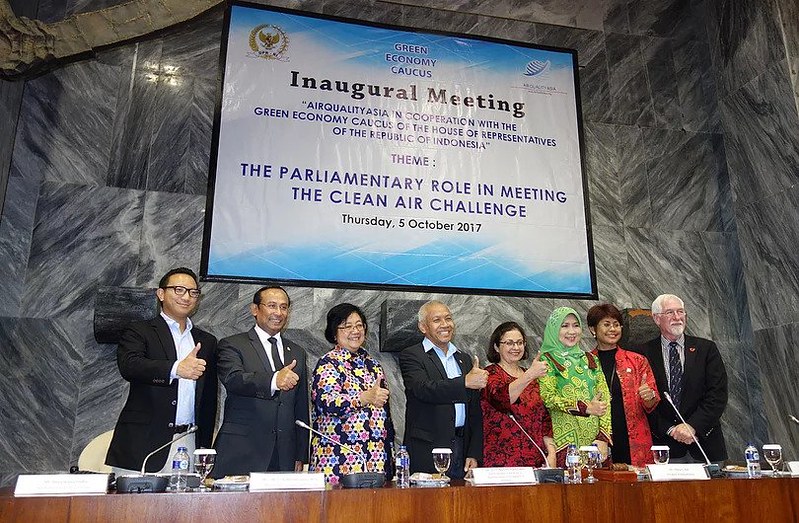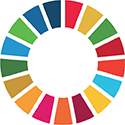
Pictured (left to right): Hon. Aryo Djojohadikusumo, MP, Hon. Satya Widya Yudha, MP, Hon. Minister Dr. Ir Siti Nurbaya Bakar, M. Sc, Hon. Agus Hermanto, MP, Deputy Speaker of the House of Representatives, Ms. Shazia Rafi, President/Convenor, AQA, Hon. Dr. Dewi Aryani, MP, Hon. Mercy Chriesty Barends, MP, Chair, Green Economy Caucus [GEC], Hon. Harry Duynhoven, Secretary, AQA.
Inaugural Round Table Consultation on Parliamentary Role in Meeting the Clean Air Challenge
Hosted by Hon. Satya Widya Yudha, MP and Board Member of AirQualityAsia & Hon. Mercy Chriesty Barends, MP and AirQualityAsia National Group Chair
House of Representatives, Nusantara II Room KK2
Jakarta, Indonesia
KEYNOTE ADDRESS
Hon. Dr. Ir Siti Nurbaya Bakar, M. Sc.
Minister of Environment and Forestry
STATEMENT
AirQualityAsia Inaugural Round Table Consultation
On the Parliamentary Role in Meeting the Clean Air Challenge
House of Representatives of the Republic of Indonesia
5 October 2017
We, the participants of the AirQualityAsia Round Table Consultation:
Acknowledging that air quality represents serious health, economic, social, environmental and transboundary challenges;
Cautioning that the drive towards economic development can lead to high levels of pollution and can carry immense health costs that can be counter-productive unless proper monitoring, emissions standards, enforcement and measures incentivizing efficient and clean use of energy are not in place to protect against air pollution and promote Sustainable Development Goals;
Committed to substantially reducing, by 2030, the number of deaths and illnesses from hazardous air pollutants and contamination (SDG 3.9); the adverse per capita environmental impact of cities, including by paying special attention to air quality, municipal and other waste management (SDG 11.6);
Committed by our governments in SDG 12.4 to achieve, by 2020, the environmentally sound management of chemicals and all wastes throughout their life-cycle, in accordance with agreed international frameworks, and significantly reduce their release to air, water and soil in order to minimize their adverse impacts on human health and the environment (SDG 12.4);
Confirming the urgent need to improve monitoring of air pollution in Indonesia, especially for PM2.5;
Confirming our commitment to protect and preserve our heritage from destruction cause by air pollution;
Acknowledging the role of urban forests in improving air quality;
Reaffirming as agreed by our governments in SDG 3.9 that ensuring clean air quality can serve improvements in global public health as well as provide robust climate adaptation measures;
Accepting as agreed by our governments in SDG 11.6 that assessment of air quality is crucial in informing policy makers for adopting corrective measures;
Acknowledging that States owe a special responsibility to one another to reduce or prevent sources of transboundary air pollution; and
Emphasizing that robust fiscal policies and incentives can lead industry investments in clean air technologies;
Agree to work within Parliament, Parliamentary Committees and with civil society organizations and other regional and international fora in which we participate, to:
-
Enhance public awareness of the dangers and costs of air pollution to individuals, societies and public health systems, to mobilize public opinion in favour of cleaner air quality across Indonesia. -
Review and revise the national energy policies with a view of mainstreaming SDGs by focusing on renewable and low-carbon energy sources. Substantially increase the share of clean energy in power sector investment. Create supporting regulation to enable large-scale development of renewable energy in Indonesia, similar to the development achieved in China, India and other emerging economies. Strengthen emission standards for thermal power plants, with a view to reaching international best practice standards.
-
Propose tax relief and subsidies that support initiatives and investment in green technologies, energy efficient industries and a low-carbon and zero-emission economy.
-
Invest in national air quality measurement systems that can provide real-time air quality data to policy-makers and the public.
-
Work with environmental health professionals to assess the annual cumulative air quality and health impacts of air pollution by all emitting sectors.
-
Work together to ensure Indonesia meets its commitments on SDGs 3.9, 11.6 and 12.4 by 2030, setting targets and creating action plans to meet air quality standards under the WHO guidelines.
-
Strengthen policies, programs and incentives for low-carbon and low-emission vehicles including electric and hybrid vehicles. Strengthen vehicle inspection and maintenance systems, set and implement a clear roadmap for cleaner transportation fuels in the country starting moving towards Euro 5/V and 6/VI. Continue to improve public transportation and mainstream non-motorized transportation (e.g., walking and cycling).
 The State of India’s Pollution Control Boards - Are they in the green?
The State of India’s Pollution Control Boards - Are they in the green?
Centre for Policy Research, April 2023
 Tracing the Hazy Air 2023 - Progress Report on National Clean Air Programme (NCAP)
Tracing the Hazy Air 2023 - Progress Report on National Clean Air Programme (NCAP)
Centre for Research on Energy and Clean Air (CREA), 2023








